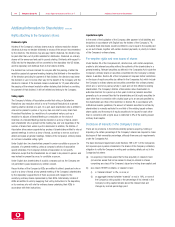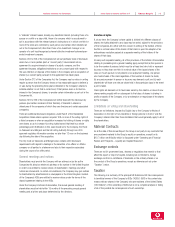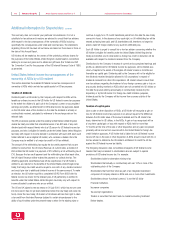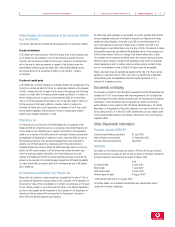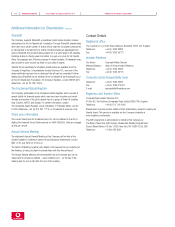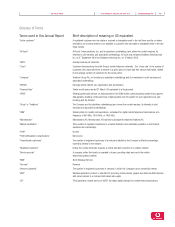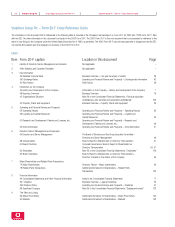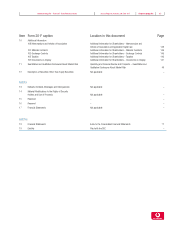Vodafone 2002 Annual Report Download - page 148
Download and view the complete annual report
Please find page 148 of the 2002 Vodafone annual report below. You can navigate through the pages in the report by either clicking on the pages listed below, or by using the keyword search tool below to find specific information within the annual report.
Vodafone Group Plc Annual Report & Accounts and Form 20-F Additional Information for Shareholders146
Additional Information for Shareholders continued
This summary does not consider your particular circumstances. It is not a
substitute for tax advice and investors are advised to consult their tax advisers
with respect to the tax consequences of the ownership of ADSs including
specifically the consequences under state and local tax laws. The statements
regarding US and UK tax laws set out below are based on those laws in force on
the date of this Annual Report.
US Holders will be treated as the owners of the underlying ordinary shares for
the purposes of the United States-United Kingdom double taxation conventions
relating to income and gains and to estate and gift taxes (the “Estate and Gift
Tax Convention”) and for the purposes of the US Internal Revenue Code of 1986,
as amended.
United States federal income tax consequences of the
ownership of ADSs by a US resident
This section describes the material US federal income tax consequences of
ownership of ADSs which are held as capital assets for US tax purposes.
Taxation of dividends
Dividends paid to a US Holder by the Company with respect to ADSs will be
taxable as ordinary income to the US Holder for US federal income tax purposes
to the extent the dividend is paid out of the Company’s current or accumulated
earnings and profits, as determined for US federal income tax purposes, based
on the US dollar value of the dividend on the date the dividend is actually or
constructively received, calculated by reference to the exchange rate on the
relevant date.
The IRS procedures operate under the existing United States-United Kingdom
double tax treaty and state that a beneficial owner of an ADS and of any cash
dividend paid with respect thereto who is a US person for US federal income tax
purposes, and who is eligible for benefits under the United States-United Kingdom
tax treaty with respect to income derived in connection with such ADS (each such
holder referred to as an eligible US Holder), who receives a dividend from the
Company may be entitled to a foreign tax credit for UK tax withheld.
The amount of the withholding tax equals the tax credit payment that you are
entitled to receive from the UK Inland Revenue. At current rates, a dividend of
£90 entitles the US Holder to a payment of £10 offset by a UK withholding tax of
£10. Because the tax credit payment and the withholding tax offset each other,
the UK Inland Revenue neither makes the payment nor collects the tax. The
offsetting payments nevertheless have US tax significance. If a US Holder is
entitled to, and elects for, the benefits of the United States-United Kingdom tax
treaty, the foreign tax credit would be equal to one-ninth of any dividend received
and would give rise to additional dividend income of the same amount. To make
an election, the US holder must file a completed US IRS Form 8833 with his
federal income tax return for the relevant year. A US partnership is entitled to
benefits under the United States-United Kingdom tax treaty only with respect to
income allocated to partners who are so entitled.
The US and UK signed a new tax treaty on 24 July 2001, which has not yet come
into force (and it has not yet been determined when the new treaty will come into
force). Under the new treaty, US holders of UK shares will lose their right to claim
a tax credit from the Inland Revenue (subject to certain circumstances to the
ability of such holders under the present treaty to elect for the existing rules to
continue to apply for a 12 month transitional period from the date the new treaty
comes into force). In the absence of any such right, no UK withholding tax will be
treated as having been paid, and US shareholders will, therefore, no longer be
able to claim US foreign credits for any such UK withholding tax.
Each US Holder is urged to consult his or her tax adviser concerning whether the
US Holder is eligible for benefits under the United States-United Kingdom tax
treaty and whether, and to what extent, a foreign tax credit or deduction will be
available with respect to dividends received from the Company.
Distributions by the Company in excess of current and accumulated earnings and
profits, as determined for US federal income tax purposes, will be treated as a
return of capital to the extent of the eligible US Holder’s basis in its ADSs and
thereafter as capital gain. Dividends paid by the Company will not be eligible for
the dividends-received deduction allowed to US corporations in respect of
dividends received from other US corporations. US Holders should consult their
own tax advisers regarding the treatment of any foreign currency gain or loss on
any pounds sterling received on ADSs which are not converted into US dollars on
the date the pounds sterling are actually or constructively received by the
depositary or by the US Holder. For foreign tax credit limitation purposes,
dividends paid by the Company will be income from sources outside of the
United States.
Taxation of capital gains
Upon a sale or other disposition of ADSs, a US Holder will recognise a gain or
loss for US federal income tax purposes in an amount equal to the difference
between the US dollar value of the amount realised and the US Holder’s tax
basis, determined in US dollars, in the ADSs. A gain or loss recognised will be
a long-term capital gain or loss with respect to ADSs held for more than
12 months at the time of the sale or other disposition and any gain recognised
generally will be income from sources within the United States for foreign tax
credit limitation purposes. A US Holder that is liable for both US federal income
tax and UK tax on the sale or other disposition of ADSs should consult with his or
her tax adviser to determine the US Holder’s entitlement to credit the UK tax
against the US federal income tax liability.
The foregoing discussion does not address all aspects of US federal income
taxation that may be relevant to stockholders who are subject to special
provisions of US federal income tax. For example:
Stockholders liable for alternative minimum tax
Stockholders that actually or constructively will own 10% or more of the
outstanding stock of the Company
Stockholders that hold their stock as part of an integrated investment
composed of Company shares or ADSs and one or more other investments
Stockholders whose “functional currency”is not the US dollar
Financial institutions
Insurance companies
Tax-exempt organisations
Traders in securities that elect mark-to-market accounting treatment
Broker-dealers










